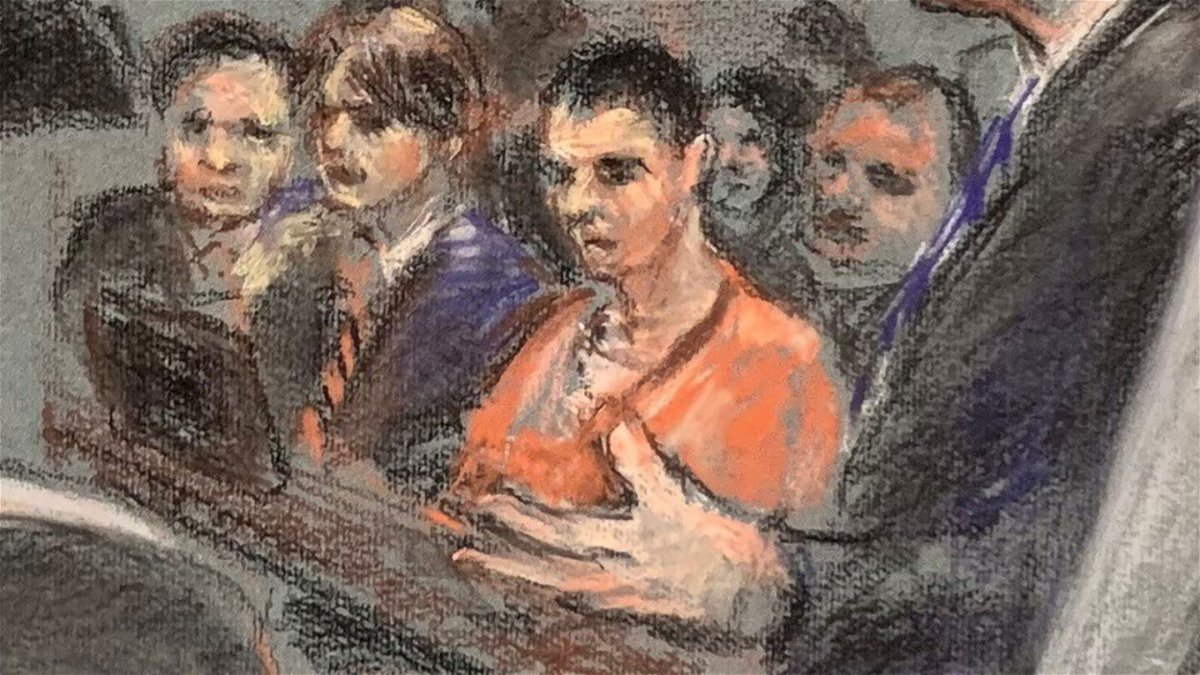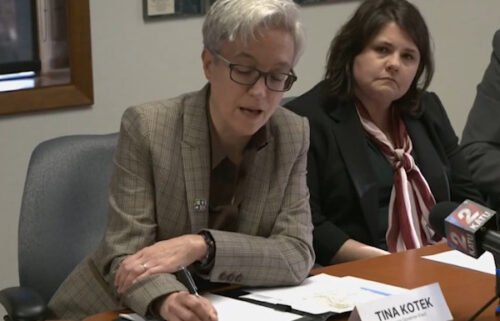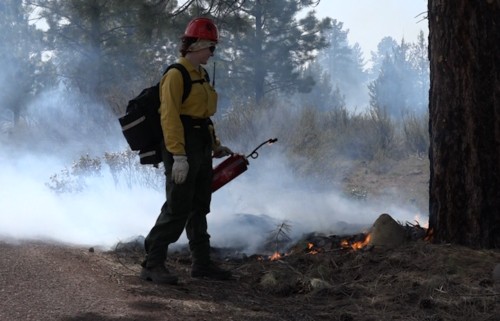Accused Pentagon leaker’s violent rhetoric raises fresh questions about top secret vetting process

Jack Teixeira sits in court on April 27.
By Natasha Bertrand, Sean Lyngaas, Zachary Cohen and Haley Britzky, CNN
New details about the 21-year-old Air National Guardsman accused of leaking a trove of classified documents online reveal how multiple red flags went unheeded and weren’t enough to prevent the Pentagon from granting him a top-secret security clearance.
Officials across the government are now scrambling to figure out why.
The US government has spent years and vast sums of money overhauling the way it vets and monitors people with access to government secrets. But that didn’t stop the Pentagon from granting a top-secret security clearance to Jack Teixeira, who prosecutors say had an arsenal of weapons at home and a history of violent online rhetoric.
Teixeira had to fill out an extensive questionnaire known as E-QIP (Electronic Questionnaires for Investigations Processing) and be vetted by the Defense Counterintelligence and Security Agency before being granted his clearance in 2021, officials told CNN.
But according to court documents filed by prosecutors on Wednesday, Teixeira was suspended from his high school only three years earlier, when a classmate “overheard him make remarks about weapons, including Molotov cocktails, guns at the school, and racial threats.”
“That clearly would have been a red flag,” one Pentagon official told CNN.
In an application for a firearm identification card in 2020, Teixeira wrote that investigators vetting him for a clearance were aware of the incident, and that he’d given them the relevant “police reports, school letters and any or all documents that were submitted to the investigator that were generated from this event.”
Teixeira also applied for a firearm identification card in 2018 and 2019, both of which were denied over concerns by his local police department about the comments he had made at his school that led to his suspension, the prosecutors said.
‘Boggles the mind’
That has left US officials probing what went wrong in the vetting process, wondering why those red flags were either overlooked or deemed insufficiently serious to prevent him from getting a clearance — and whether that was a one-off, or a wider, more systematic problem that needs to be overhauled.
The Senate Intelligence Committee has twice in the last week asked the Office of the Director of National Intelligence and the Pentagon for more information about Teixeira’s vetting, a committee aide told CNN. And the Air Force’s Inspector General investigation is specifically examining the Pentagon’s vetting process and whether any procedures were violated or ignored, Pentagon officials said.
Pentagon press secretary Brig. Gen. Patrick Ryder told reporters on Thursday that when vetting someone for a security clearance, the adjudicator examines “a sufficient period” in someone’s life to determine if they are eligible. If there was bad behavior during that period, several factors are considered, including the seriousness of the conduct, the individual’s age and maturity when it happened, whether any coercion occurred, and the likelihood of it happening again.
Experts say the incident is an example of the Pentagon’s continued failure to prevent extremists from joining its ranks.
“Teixeira is a great example of how the department of defense has failed to figure out how to root out extremists,” said Kris Goldsmith, an Army veteran and CEO of Task Force Butler, a non-profit focused on combating extremism in the military. “The fact that he was able to get a top secret security clearance after it became known to the local police that he shouldn’t have a gun, kind of boggles the mind and it makes me wonder what other kind of problems there are with the clearance system.”
According to court documents, when Teixeira applied again in 2020 for a firearm identification card, he cited his position in the military and his top secret clearance as reasons why he should be entrusted with a firearm. Prosecutors say when the FBI searched Teixeira’s room after arresting him earlier this month, they found “multiple weapons, including handguns, bolt-action rifles, shotguns” and an “AK-style high-capacity weapon.”
‘Why wasn’t he caught earlier?’
Another question facing investigators is how they could have caught Teixeira’s online postings, which included hundreds of classified documents and alleged comments about killing people, sooner. Teixeira allegedly made the posts in a private chatroom on social media platform Discord, something that the Pentagon can’t monitor without an overhaul in privacy rules for servicemembers.
The Defense Department only learned about the leak on April 6, four months after prosecutors say Teixeira began posting the documents on Discord. The New York Times has reported that Teixeira began leaking documents in a public Discord chatroom as early as February 2022.
Teixeira also allegedly posted on Discord that he wanted to “kill a [expletive] ton of people” because it would be “culling the weak minded,” and allegedly asked another user for advice on how to carry out a shooting “in a crowded urban or suburban environment.”
“The leaker is being prosecuted, but what this has exposed is the need to re-examine our processes: why wasn’t he caught earlier?” Democratic Sen. Mark Warner, the chairman of the Senate Intelligence Committee, told CNN. “Do so many people need access to these documents?”
Warner added that the Senate Intelligence Committee, “in a bipartisan way, is working on legislation to reform the classification process” because he believes the US government over classifies information, leading to too many people having access to classified documents.
Catching ‘insider threats’
There have been multiple US government efforts to revise the processes for granting security clearances and monitoring access to classified systems following damaging leaks or acts of violence by clearance holders a decade ago.
After former National Security Agency contractor Edward Snowden exposed the scope of the NSA’s intelligence gathering apparatus in 2013, the Pentagon and spy agencies rolled out new measures to catch “insider threats” that detect when an employee gains unauthorized access to a classified system.
That same year, in September 2013, a US Navy contractor Aaron Alexis shot and killed 12 people at the Washington Navy Yard. A Pentagon review of the incident found that Alexis’ employer, an IT contractor, did not report concerns about his mental health to the Navy, allowing Alexis to maintain his clearance.
The main government program for catching someone like Teixeira is a multibillion-dollar effort begun in 2018. That program — largely run by the Defense Counterintelligence and Security Agency (DCSA) — aims to continuously vet security clearance holders for warning signs rather than periodically investigate them every five to 10 years.
Carrie Wibben, the DCSA’s former deputy director, said that background checks include high-level reviews of social media posts but that more invasive searches are off-limits because of privacy safeguards.
“There’s a line there that I don’t know that we can cross in the process,” Wibben told CNN.
Still, lawmakers as well as current and former US officials tell CNN there is clearly a need to delve deeper into the backgrounds of people like Teixeira who have access to the nation’s secrets. There is currently a focus in background investigations on counterintelligence threats and the likelihood that someone might hold foreign allegiances, according to former NSA general counsel Glenn Gerstell.
“We do not focus anywhere as much on overall fitness, character [or] trustworthiness,” said Gerstell. “We don’t really get into deep psychological profiling of anybody that might, in this particular case, have picked out [Teixeira].”
Social media still new to the government
A Pentagon official told CNN that despite the department’s stated commitment to “continuous monitoring” of personnel even after they have received their clearance, defense officials are limited in what they can collect domestically about US persons.
“Social media is a new world that the government really hasn’t gotten ahold of yet,” said Brad Moss, a lawyer who specializes in national security and security clearance law. “They generally don’t bother perusing your accounts (if they are even public-facing) absent a separate, independent reason to do so.”
Multiple Pentagon officials also said the Teixeira incident underscores the importance of DoD’s insider threat efforts, which rely on an individual’s colleagues and superiors to report any suspicious behavior.
“I think until junior troops understand how to interpret how their peers are acting, commanders are never going to know if a Teixeira is an extremist,” said Goldsmith. “He’s showing up in uniform, he’s going to have his uniform clean, he’s going to salute, his commanders don’t know anything about Teixeira.”
Prosecutors said that an airman who served with Teixeira told the FBI as part of the leak probe that “Teixeira was very quiet, but often talked about guns. He also said he believed he would be the first person Teixeira would shoot if Teixeira were to shoot anyone in the workplace.”
It is not clear whether this colleague ever reported his concerns about Teixeira to his superiors — the investigation is still examining whether any complaints were made about Teixeira during his time in the Air National Guard, a Pentagon official said.
Two leaders of Teixeira’s unit have now been suspended as the investigation has progressed, the Air Force said on Wednesday: the commander of the 102nd Intelligence Support Squadron and the detachment commander overseeing administrative support. The two officers have also lost their access to classified systems and information.
The-CNN-Wire
™ & © 2023 Cable News Network, Inc., a Warner Bros. Discovery Company. All rights reserved.



